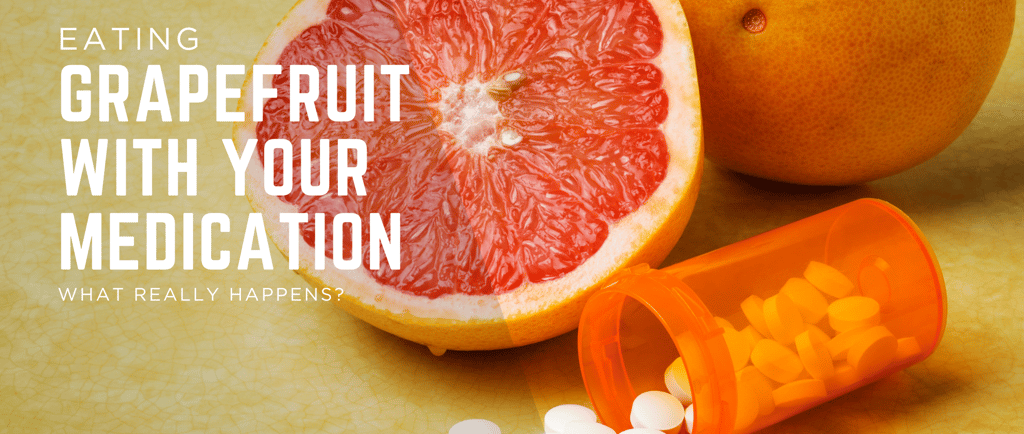What Really Happens If You Eat Grapefruit with Your Medication?
Grapefruit can interfere with how certain medications are broken down in the body, potentially leading to dangerous side effects or reduced effectiveness. This happens because compounds in grapefruit block enzymes that help metabolize many prescription drugs.
NUTRITION AND MEDICATION INTERACTIONS
Iola Prieto
4/10/20257 min read


Introduction to Grapefruit and Medications
Grapefruit is a tropical citrus fruit that has gained attention not only for its distinct flavor but also for its significant impact on the metabolism of various medications. Numerous studies have highlighted that grapefruit can interfere with drug metabolism due to its unique biochemical characteristics. The fruit contains compounds known as furanocoumarins, which can inhibit the activity of certain enzymes in the liver, particularly cytochrome P450 3A4 (CYP3A4). This enzyme plays a critical role in the metabolic process of many pharmaceuticals, effectively determining how quickly these medications are broken down and eliminated from the body.
This interaction can lead to either increased levels of medications in the bloodstream or diminished effectiveness, creating a range of potential side effects and complications for individuals who consume grapefruit while on certain prescriptions. For instance, drugs that are intended to lower cholesterol, manage blood pressure, and treat anxiety may be especially affected by grapefruit consumption, ultimately leading to serious health implications if not properly managed.
The concern surrounding grapefruit and medications is not merely anecdotal; it is well-documented in medical literature. Pharmacists, healthcare providers, and patients alike are recommended to be aware of these interactions to avoid unexpected outcomes. As the popularity of grapefruit continues and its use in dietary regimens rises, understanding grapefruit's effects on medication metabolism becomes increasingly crucial for those taking prescriptions that could be impacted by this citrus fruit. Educating oneself on the implications of grapefruit consumption alongside medications can aid in maintaining effective treatment outcomes and ensuring overall safety.
Understanding Drug Metabolism
Drug metabolism refers to the process by which the body transforms pharmaceutical substances into compounds that can be easily eliminated. This process is crucial for ensuring that medications exert their intended effects and do not accumulate to toxic levels within the body. Primarily, drug metabolism takes place in the liver, where various enzymes are responsible for breaking down medications. Among these enzymes, the cytochrome P450 family plays a vital role, particularly the enzyme CYP3A4, which is responsible for the metabolism of approximately 50% of all commonly prescribed medicines.
CYP3A4 is significant because it mediates the biochemical transformations necessary for drug clearance. When a medication is ingested, it is absorbed into the bloodstream and transported to the liver, where CYP3A4 acts upon it. The enzyme chemically modifies the drug, often converting it into a more water-soluble form that can be excreted via urine or bile. The efficiency of CYP3A4 can vary from person to person due to genetic factors, concurrent medication use, and diets, influencing how effectively a drug is processed.
Grapefruit and its juice have been identified as potent modifiers of the drug metabolism pathway, especially concerning CYP3A4 activity. Consuming grapefruit can lead to increased blood levels of certain medications, as this fruit inhibits the CYP3A4 enzyme. The impact is significant because the inhibition can result in the delayed clearance of drugs from the body, leading to potentially elevated effects or adverse reactions. As such, understanding the mechanism of drug metabolism, particularly involving CYP3A4, is essential for developing safe medication protocols, especially for individuals who may be consuming grapefruit concurrently with their prescriptions.
The Effects of Grapefruit on Medication Absorption
Grapefruit, a popular citrus fruit, is known to have potential interactions with certain medications, primarily due to the presence of specific compounds that affect drug metabolism. These compounds, mainly furanocoumarins, can inhibit the activity of cytochrome P450 enzymes, particularly CYP3A4, which play a crucial role in the metabolism of various drugs. By blocking these enzymes, grapefruit can lead to increased blood levels of certain medications, potentially resulting in adverse side effects.
When grapefruit juice is consumed, it can significantly enhance the absorption of drugs that are typically processed by CYP3A4. This can lead to an increased risk of toxicity, especially in medications with a narrow therapeutic index. For example, statins, commonly prescribed for lowering cholesterol, can have dangerously elevated levels when taken alongside grapefruit juice. The result may be severe muscle pain or liver damage in some patients.
On the other hand, grapefruit may also decrease the absorption of specific medications by affecting their bioavailability. While not as frequently discussed, certain drugs may become less effective when their absorption is hampered. An example of this scenario can be seen with some antihypertensive medications, where the presence of grapefruit inhibits the amount of drug entering systemic circulation, leading to suboptimal blood pressure control.
Clinically, the implications of these interactions are significant. Healthcare providers must be vigilant about documenting patients’ dietary habits and educating them regarding potential food-drug interactions. Patients should be advised to avoid grapefruit and its juice when prescribed certain medications, especially those metabolized by CYP3A4. It is essential for individuals to discuss their medication regimen with healthcare professionals to mitigate any potential risks associated with grapefruit consumption.
Common Medications Affected by Grapefruit
Grapefruit consumption can significantly affect the efficacy and safety of several medications due to its ability to inhibit specific enzymes in the liver. One major group of medications affected by grapefruit is statins, which are commonly prescribed to lower cholesterol. Statins such as atorvastatin and simvastatin are particularly susceptible. When grapefruit is consumed, it can increase the concentration of these drugs in the bloodstream, leading to a higher risk of liver damage and muscle-related issues, including rhabdomyolysis, a serious condition that can result in kidney failure.
Another category of medications that can interact negatively with grapefruit are certain blood pressure medications. Calcium channel blockers, such as amlodipine and felodipine, are frequently prescribed to manage hypertension. Grapefruit juice may amplify the effects of these medications, causing an excessive drop in blood pressure and increasing the risk of side effects like dizziness and fainting. It is essential for patients on these medications to consult with their healthcare provider to evaluate any dietary restrictions concerning grapefruit consumption.
Furthermore, certain antidepressants can also experience adverse interactions with grapefruit. Medications like sertraline and fluvoxamine can have their metabolism altered due to grapefruit intake, potentially leading to elevated levels in the body. This elevation can result in heightened side effects, including increased anxiety, agitation, or even serotonin syndrome, a rare but dangerous condition.
Overall, it is crucial for individuals taking these or similar medications to be aware of the potential interactions with grapefruit. Engaging in discussions with healthcare professionals about diet and medication is vital to ensure safe and effective treatment.
Signs of Potential Drug Interaction
Many individuals are unaware of the potential effects of grapefruit consumption on their medications. Grapefruit, while healthy in many respects, is known to interfere with the metabolism of certain drugs. This interaction occurs mainly due to compounds in grapefruit, such as furanocoumarins, that can inhibit enzymes responsible for drug metabolism in the liver and intestines. It is essential to recognize signs that may indicate a drug interaction as a result of grapefruit consumption.
Symptoms of potential drug interactions can vary depending on the type of medication involved. Common signs to watch for include unusual drowsiness, dizziness, or fatigue, which may indicate that the medication is not being processed effectively in the body. Gastrointestinal symptoms such as nausea, vomiting, or abdominal pain may also manifest, signaling that the drug’s efficacy or safety may be compromised. Additionally, if you experience increased heart rate or fluctuations in blood pressure, those may be warnings that grapefruit is affecting your medication.
Some individuals might also notice mood changes or cognitive impairment, such as confusion or difficulty concentrating, which can result from altered medication levels in the bloodstream. It is crucial for those taking medications known to interact with grapefruit to monitor these symptoms closely. In particular, individuals on medications for cardiovascular issues, anxiety, or certain antibiotics should be especially cautious.
If you suspect that grapefruit could be influencing your medication’s performance or if you experience any of these symptoms, consult your healthcare provider. They can provide personalized advice and necessary changes to your treatment plan to avoid unwanted interactions. Recognizing the signs of drug interaction is key to maintaining your health and ensuring medication effectiveness.
Precautions for Grapefruit Consumption with Medications
When considering grapefruit consumption alongside medications, it is essential to understand the potential interactions that can occur. Grapefruit and grapefruit juice are known to impact the metabolism of several drugs, primarily due to their influence on the cytochrome P450 enzyme system in the liver. This interaction can lead to increased concentrations of medications in the bloodstream and may heighten the risk of adverse side effects.
For individuals who enjoy grapefruit and are on medication, it is crucial to exercise caution. Firstly, consulting with a healthcare professional before including grapefruit in your diet is advisable. Physicians or pharmacists can provide tailored advice based on your specific medications and health conditions. They may recommend either avoiding grapefruit entirely or identifying safe consumption levels, as individual responses may vary.
For those who may have been advised to limit or avoid grapefruit, various alternative food options can offer similar flavor profiles without the associated risks. Citrus fruits such as oranges, lemons, and limes can often be enjoyed without the same concerns regarding medication interaction. Additionally, non-citrus fruits, such as berries or apples, can serve as healthy substitutes while providing beneficial nutrients.
Moreover, it is important to be vigilant about food label readings and ingredient lists, especially when consuming beverages or processed foods that might contain grapefruit or grapefruit-derived products. Even small amounts can trigger interactions with certain medications. Maintaining open communication with healthcare providers regarding dietary habits can enhance medication efficacy and safety, ensuring a balanced approach to both nutrition and health management.
In the context of grapefruit and medication, individuals are encouraged to prioritize their health by being well-informed and cautious, allowing for safe dietary choices that complement their medical treatment.
Conclusion and Recommendations
In conclusion, the interaction between grapefruit and various medications should not be taken lightly. Numerous studies have highlighted that grapefruit and its juice can significantly affect the metabolism of certain drugs, leading to increased side effects or diminished efficacy. This phenomenon primarily occurs due to compounds found in grapefruit, particularly furanocoumarins, which inhibit specific enzymes in the liver and intestines responsible for drug metabolism. Consequently, individuals who consume grapefruit while on certain medications may unintentionally expose themselves to harmful levels of their prescribed drugs.
It is crucial for patients to remain vigilant regarding their dietary choices, especially when they are on medications known to interact with grapefruit. Healthcare professionals play a critical role in this aspect. Discussing dietary habits with a pharmacist or physician can provide crucial insights into which medications pose risks when combined with grapefruit. Each patient’s situation is unique, and understanding individual risks associated with drug interactions is paramount for safe and effective treatment.
Additionally, alternative dietary options that do not interfere with medication should be considered. For instance, choosing other fruits that do not carry similar interaction risks can help maintain a healthy diet without jeopardizing the effectiveness of medical treatments. While the concern regarding grapefruit should not instill fear in patients, being informed equips individuals to make sensible and safe dietary choices. Staying knowledgeable about food-drug interactions empowers patients to take an active role in their health, ultimately contributing to better health outcomes.
By fostering open communication with healthcare professionals and utilizing readily available information, individuals can navigate the complexities of their treatment plans more successfully, ensuring that both their medications and dietary habits work synergistically for their overall health and well-being.
Wellness
Empowering you through fitness and nutrition coaching.
Contact Us
Join The Staymoving community
+1-868-359-9361
© 2025. All rights reserved.
